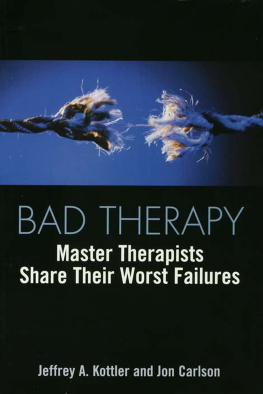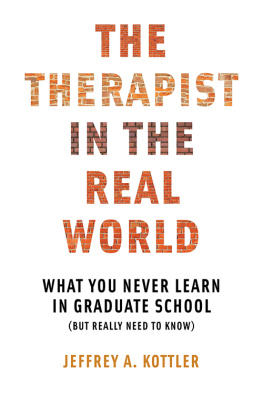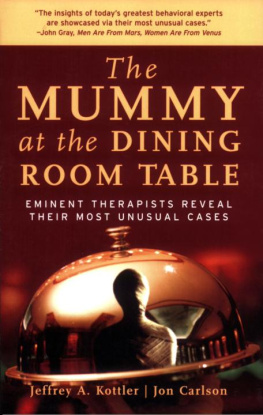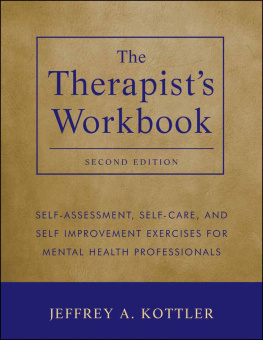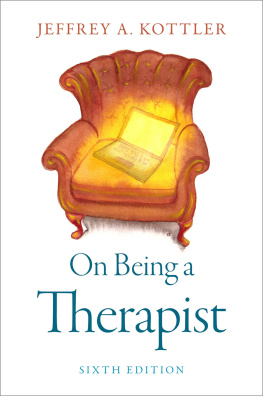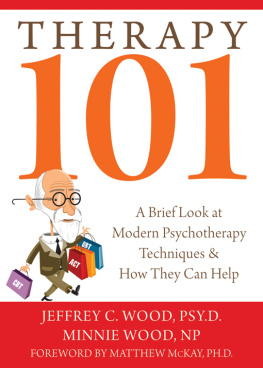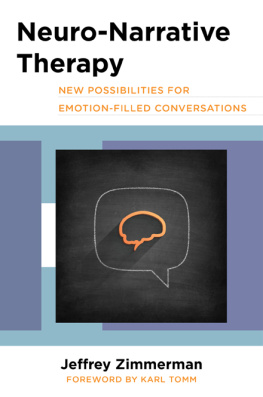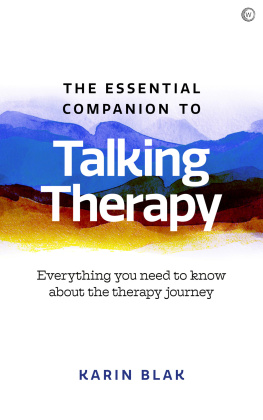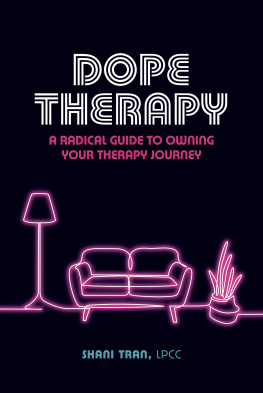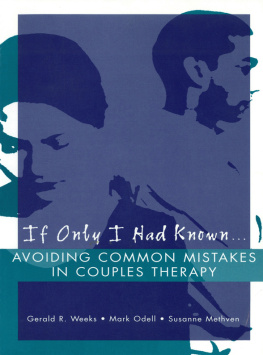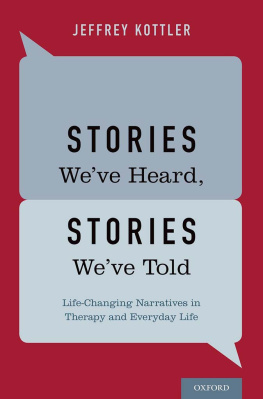BAD THERAPY
BAD THERAPY
Master Therapists
Share Their Worst Failures
Jeffrey A. Kottler, Ph.D.
and Jon Carlson, Psy.D, Ed.D.
Brunner-Routledge
New York and Hove
Published in 2003 by
Brunner-Routledge
29 West 35th Street
New York, NY 10001
www.brunner-routledge.com
Published in Great Britain by
Brunner-Routledge
27 Church Rd.
Hove, East Sussex
BN3 2FA
www.brunner-routledge.co.uk
Copyright 2003 by Taylor & Francis Books, Inc.
Brunner-Routledge is an imprint of the Taylor & Francis Group.
Printed in the United States of America on acid-free paper.
All rights reserved. No part of this book may be reprinted or reproduced or utilized in any form or by any electronic, mechanical, or other means, now known or hereafter invented, including photocopying and recording, or in any information storage or retrieval system, without permission in writing from the publisher.
10 9 8 7 6 5 4 3 2 1
Library of Congress Cataloging-in-Publication Data
Kottler, Jeffrey A.
Bad therapy : master therapists share their worst failures / Jeffrey A. Kottler and Jon Carlson
p. cm.
Includes bibliographical references.
ISBN 0415933226 (alk. paper) 0415933234 (pbk.)
1. Psychiatric errors. I. Carlson, Jon. II. Title.
RC455.3 .E76 K68 2002
616.89dc21 2002008676
CONTENTS
ABOUT THE AUTHORS
JEFFREY A. KOTTLER, Ph.D. is Chair of the Counseling Department at California State University, Fullerton. He has authored over 45 books for practitioners (On Being a Therapist, The Imperfect Therapist, Compassionate Therapy, Making Changes Last); students (Nuts and Bolts of Helping, Introduction to Therapeutic Counseling, Learning Group Leadership, Theories in Counseling and Therapy); teachers (On Being a Teacher, Succeeding With Difficult Students); and the public (Private Moments, Secret Selves, Travel That Can Change Your Life, The Language of Tears, The Last Victim).
Jeffrey has been an educator for 25 years. He has worked as a teacher, counselor, and therapist in preschool, middle school, mental health centers, crisis centers, universities, community colleges, and private practice. He has served as a Fulbright Scholar and Senior Lecturer in Peru (1980) and Iceland (2000), as well as worked in dozens of countries as a consultant and trainer specializing in multicultural issues.
JON CARLSON, Psy.D., Ed.D. is Distinguished Professor of Psychology and Counseling at Governors State University, University Park, Illinois and a Psychologist with the Wellness Clinic in Lake Geneva, Wisconsin. Jon is the author of 25 books, 100 journal articles, serves as Editor of The Family Journal, and is the developer of over 100 videotapes. These instructional videos feature today's leading experts in the fields of psychotherapy, family therapy, brief therapy, substance abuse and treatment, parenting, and couples education. Dr. Carlson has received Distinguished Services awards from the American Psychological Association, the American Counseling Association, International Association of Marriage and Family Counselors, and the North American Society of Adlerian Psychology.
A few of Jon's best known books include: Brief Therapy With Individuals and Couples, The Disordered Couple, Interventions and Strategies in Counseling and Psychotherapy, and Family Counseling: Strategies and Issues.
PREFACE
This is a book that reveals, with surprising honesty, the worst mistakes of the best therapists. Told through the narratives of their most stunning failures, two dozen of the world's most famous practitioners talk about their mistakes, misjudgments, and miscalculations that haunt them to this day. From such stories, readers are offered a rare glimpse into the hearts and minds of the profession's most famous authors, theoreticians, and leaders.
WHEN THINGS GO WRONG
Therapists have a long history of inventing ways to disown our misjudgments and mistakes. We blame our clients for not trying hard enough or being unmotivated. We ascribe negative outcomes to circumstances beyond our controlmeddling family members, organic or environmental factors, time constraints. We call our clients ugly names like borderline or obstructive or resistant. All this means is that the people we are trying so hard to help are not cooperating with our best efforts, or more likely, they aren't meeting our expectations.
In moments of honesty, or when our guards are down, all of us are haunted by those we couldn't help. We are especially bothered by those (we hope) few occasions when the bad therapy occurred as a result of our own blunders. We pushed too hard too fast; we misread the situation; we missed crucial information. Our own personal issues were triggered. We were less than tactful. We bungled the diagnosis. We were less than skillful in executing an intervention. In these ways, and a hundred others, we flat out blew the interview. We chased the client away. We may have set treatment back significantly. Then, if we could get away with it, we pretended it all never happened. Denial and defensiveness provide a convenient means to bury our mistakes, sometimes to help us pretend they never happened in the first place.
Progress notes become less than accurate, reports to supervisors less than fully disclosing. The name of the game is cover your butt, protect yourself from malpractice claims and censures from supervisors. And many of us collude to blame the client whenever possible. When that doesn't work, then it must be some other third party who is ruining our perfectly good efforts.
There is no doubt that the subject of this book is very threatening and challenging to talk about in frank and honest ways. Who wants to discuss the worst disappointments and disasters they have faced? Who wants to read a book about the worst stuff in our profession?
If we are going to cover this subject, then we decided to do so with a more upbeat emphasis by focusing not just on what went wrong but also on what can be learned from the mistakes. Growth and learning, after all, often result from making sense of things that go wrong. This is especially the case when we are reflective and systematic about deconstructing the sequence of events and making sense of the experience. This is no less than what we expect of our clients.
THE PARTICIPANTS
The major premise of this project was that if we could get the most prominent practitioners and thinkers in the field to talk about their worst work, then perhaps this would create a forum for others to discuss their lapses, mistakes, misjudgments, and failures more openly and constructively.
We selected our subjects based on what we believe to be their impact and influence on the profession. They had to be prominent, which we defined as: (1) having a body of published work that is known to many practitioners; (2) having clinical experience spanning over many years to draw on; (3) a willingness to participate. We leaned heavily on personal contacts, especially those from Jon Carlson's film series, Psychotherapy with the Experts. We tried for a cross-section of representative styles and theoretical orientations.
The reader may wonder why certain people were included and others were not part of this investigation. As you might expect, some people respectfully declinedfor very good reasons. Why, after all, would people who have achieved prominence risk their reputations by talking in public about the worst example of his or her work? Why indeed?
Every one of the contributors to this book volunteered to participate primarily because they had already worked with one of us in some capacity. There was a preexisting relationship built on some degree of trust and mutual respect. They felt reassured perhaps that we would not use what they shared with us to hurt them or take advantage of them in some way. Many of these prominent people had been burned before by others who took advantage of them.

